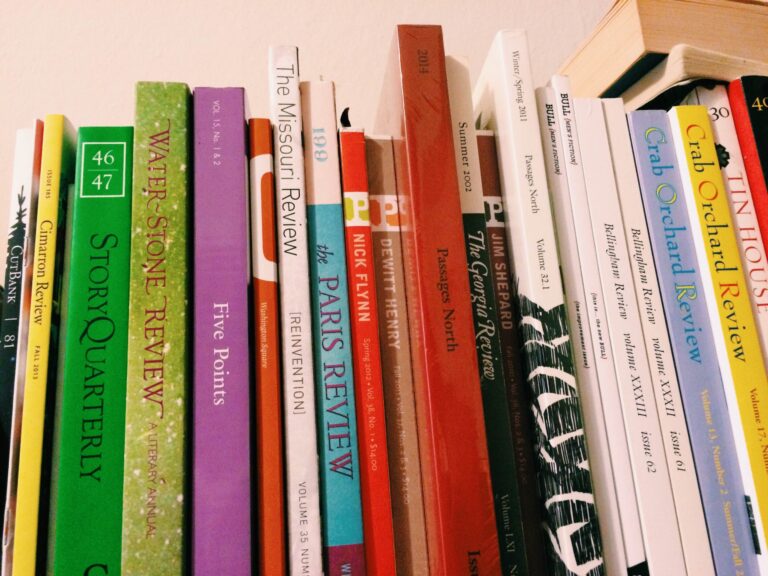The Independent Publishing Resource Center

This is the fifth post in a Ploughshares series where Charlotte Donlon interviews people who promote and support writing and creativity. The other posts in this series can be found here.
A.M. O’Malley is the Executive Director for the Independent Publishing Resource Center (IPRC), a nonprofit arts organization in Portland, which she describes as a launchpad for artists, writers, and makers. The IPRC has been around since 1998, and O’Malley first got involved with it in 2007 when she moved to Portland from the midwest. As a writer who had been making zines for a long time, she was familiar with the IPRC, and because of her unique skill set, she started working for the organization part-time as the outreach coordinator shortly after moving to Portland. She went full-time with them seven years ago as the program director, and became the executive director about eight months ago.
Making the transition from working in a more creative capacity to doing everything the executive director position entails has been interesting for O’Malley, especially with the current climate in Portland. The IPRC is struggling to stay on top of the city’s premium cost of living. As a result of rising real estate prices, many artists have been pushed out of their studio spaces or are at risk of being pushed out in the future. In addition to the higher demand for real estate in general, there is more interest from cannabis and food industries in the types of spaces that have appealed to artists.
The IPRC is currently facing a 300% rent increase in their current location on SE Division, and the their most recent Kickstarter project raised funds to help with expenses associated with finding a new location. Many of the backers for this round of funding were current members, former students, and other individuals from Portland’s literary community. This was the IPRC’s most successful Kickstarter project they’ve ever had; they raised more money and had more individual backers than any of their previous Kickstarters. Seeing people stretch themselves and give financially is encouraging to O’Malley and the IPRC family. It was a reminder that people know about the IPRC and appreciate the support and programs it provides.
One of the programs that stands out from the standpoint of providing support for writers is the IPRC Certificate Program, a yearlong study in creative writing, with four tracks, including prose, poetry, image & text, and comics. It was started in 2008 out of a desire to diversify the IPRC and to help fill a gap for local writers. Since then approximately 700 people have completed the certificate program, which provides instruction in writing and self-publishing with workshops such as graphic design, book arts, letterpress and screen-printing instruction. It has been incredibly successful in providing writers an environment where they can develop a manuscript, have a cohort, connect with a community of writers, and create a small print run of a chapbook-sized piece of creative writing.
Students of the IPRC Certificate Program also work on the 1001 Journal while they are in the program. They go through the submissions that come in every January through March, edit the various prose, poetry, comics, and image & text pieces selected for publication, and make the journal in the IPRC lab.
Graduates of the certificate program go on to do different things after they finish, from pursuing MFA programs, starting reading series, or even their own publishing imprints. Michael Heald of Perfect Day Publishing is one example of a writer who started his own publishing endeavor and continues to use the center’s resources to publish his books since completing the program. Just this past fall, Perfect Day released its sixth book, Martha Grover’s The End of My Career.
Because of the success of the IPRC Certificate Program, this organization which started primarily as a zine writer’s resource is now considered by many to be a literary arts organization that empowers people to create their own media.
The IPRC is also thinking through new ways to serve their community and reach a wider range of people in the Portland area. O’Malley says they are considering creating a project management program for people who want to write a book but don’t feel like they can do it on their own for whatever reason. In this arrangement, the IPRC would provide someone to walk more hesitant writers through the process and support them throughout the writing, editing, and publishing phases. The IPRC wants to empower others to make their own work, and they see this potential program and service as an option for those who desire to write and make a book, but think they’re not capable of doing so on their own.
In spite of the disheartening situation that the IPRC and other arts organizations in Portland are facing, O’Malley stays hopeful about the future. They have provided support and programs for artists, writers, and makers since 1998, and they plan to do whatever they can to make sure they keep doing so moving forward. One way O’Malley stays inspired in her work with the IPRC is her commitment to taking a daily, afternoon walk through the IPRC to see and speak with the writers and makers in the space. She says, “Everyone is at the IPRC because they want to be there. They’re not there because they don’t know where else to be. They’re not there because it’s a stepping stone to get somewhere else. They’re there because they want to make art.”


